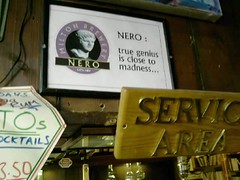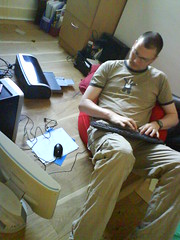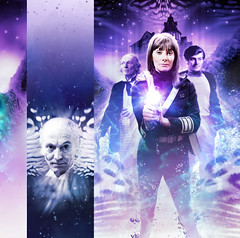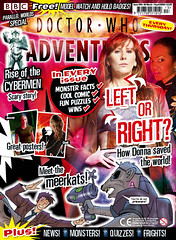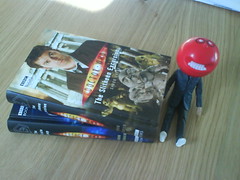So what to to make of
Watchmen? I loved the comic in my teens (though not as much as I loved
V For Vendetta), and recall the
bloke who wrote Batman (1989) and Terry Gilliam both saying it could never be filmed. It's complex and strange, packed full of incident and the juxtaposition of repeated images. So any film would surely just be not quite as good as the source. Which is what's happened whenever they've put
Alan Moore's other great comics on screen.
And yet for the most part I think Watchmen works as a movie. It's complex and strange and I keep picking over it like with the gap between my teeth. There's an awful lot that I like – Rorshach's mask and his performance, the opening titles, the look and feel of Archie. But there's also much that is bothersome...
Spoilers
obviously
follow
for
both
the
comic
and
the
film...
The choice in any adaptation is what to keep and what to cut out. Director Zack Snyder has slavishly kept close to the source: it's evident Dave Gibbons' artwork has been used to storyboard the film, and whole sections of the film's dialogue are lifted from the comic's balloons.
I'm surprised by how much of the comic makes it into the film. In fact, it feels too long at two-and-a-half hours. They could have cut back more.
The change to the ending in the comic keeps things simpler, and cuts out a whole sub-plot about pirate comics and a writer off making a movie. Veidt setting up Dr Manhattan works better than the comic's faked alien menace anyway. It makes Manhattan's slow separation from humanity part of the plot rather than an intriguing aside.
But my major concern is not with what's been taken out but added. In the comic, the murder of the Comedian is shown in the first four pages, in flashback, pressed in between panels of the cops looking round over the dead man's flat. Eddie Blake doesn't have a chance to fight back.
In the movie, there's a whole martial arts sequence like out of any superhero movie. Blake goes out fighting, punching through bricks and the kitchen cabinets, revealing super-human speed and strength. It misses something fundamental about what the comic's doing: grounding the outlandish events and characters in a grubby, mundane reality. These heroes are (for the most part) ordinary mortals. They're as fallible, flawed and falling apart as the rest of us.
The film's costumed heroes sport the same PVC chic as the comic-book movies since Batman in '89. They fight in the same ways as other comic-book movies, and there are the same fast CGI pull-backs to reveal huge buildings and landscapes. As a result it feels like a response to those movies: more about the X-Men of the 21st century than the 1980s.
That's not helped by the music. I know a few people who love the film's music, but I found the choices of tune just odd. It doesn't give any sense of the period: Bob Dylan and Jimi Hendrix both suggest the 60s. “All along the watchtower” is used in Withnail & I to a much better effect.
While the comic had a very particular sense of its period – an alternative, awful “now” - the film is a mish-mash of the nostalgic and contemporary, and neither quite feels right. If only it could have felt more like the brilliant title sequence, showing American history with the added bonus of heroes. Well, brilliant but for one little grumble.
The sequence shows assassination of JFK and then shows the Comedian wielding the rifle. It's a crass realisation of what in the comic is just an aside, the Comedian boasting to some mates at a party.
Too often the film favours the crass and simplistic over the more intriguing and complex. Laurie tells her mother she loves her, while in the comic those words never need to be said because its implicit in the scene.
The Dr was concerned by the not-quite-brilliant qualities of the actresses playing Laurie and her mum. But there’s no subtlety in their dialogue to play off: they seem awkward and stupid for stating the bleeding obvious.
More than that, special effects movies mean playing to green curtains and ping-pong balls on sticks. The film's editor can be more thrilled by the assembly of the disparate elements of the shot than the quality of performance. Just as Dr Manhattan sees human beings and their feelings as merely some tricky jigsaw. (See also the affect on Star Wars once technology let George Lucas build his empire whatever way he liked.)
It also doesn't help how “false” a lot of the film feels. The comic is grounded in realism: heroes who get dementia and drunk, who get old and die. There's something still strange and disturbing about superheroes being drafted into the war in Vietnam. In the film, the Nam sequences felt especially contrived, more Photoshop than photo realism.
There's been some mocking of the prosthetics and President Nixon's nose. The film makes more of him – and Kissinger – than the comic does, which diminishes his impact. He's a weird caricature in the film, a credible world leader bent under terrible pressure when we glimpse him in the comic – where he never says a word. There's nothing in the comic I can think of that Nixon's estate might want to sue.
The film also gets in a gag about Americans not accepting a cowboy into the White House. To do this they fudge a better gag in the comic, where it's Robert Redford standing for election in 1988. Would Reagan have been well enough to stand in ’88? And surely the point about Redford is he offers an alternative to the hard-line Republicanism Nixon represents in this world. The film throws out the political reality in favour of a cheap gag.
Likewise, Ozymandias says in the film that he's “not a comic book villain”, when that's plainly what he is. In the comic its “republic serial villain” because in a world where there are real superheroes, they don’t feature in comics. Again, the film loses out by putting things so bluntly.
The comic is violent but this is more so: there are extended and bigger fight scenes, a man having his arms cut off where he's just quickly stabbed in the comic, Dr Manhattan not just disintegrating people but spattering them all over the ceiling.
While the comic shows sex and bosoms and a full frontal blue willy, in the film it feels much more like titillation. Like some of the swearing in the first series of Torchwood (or
when I took over Benny) this desperate effort to appear more adult just makes it seem
more adolescent. The sex scene between Dan and Laurie should have felt more like the one in Don't Look Now: no soft focus, unglamorous, tender.
But the film also pulls its punches. The scenes of devastated New York are much bloodier in the comic. Even the “clean” nuclear explosion would leave people burned and horribly disfigured. Perhaps this film plays to a modern audience's subconscious horror of 9/11 (I was surprised not to see the Twin Towers collapse in that final attack), but it didn’t seem horrific enough. We need to be utterly appalled by what Veidt has done for the moral conundrum of the last scenes to carry any weight. It's not enough in the film that one of those killed in New York is Rorschach's psychologist. The comic introduces a whole load of familiar faces, and we don't even know their names.
It's a bold film full of flickers of brilliance. This great long post suggests I didn't enjoy it when I largely did. But I keep thinking how it might have been done differently. How the same cast and crew made a better version. Just in a world not that different from our own...
 This afternoon I was in drizzly, grey Greenwich to discuss a potential project. I lived in Greenwich 2002-04 and got married in the Queen's House. For a couple of years I used to pass through the royal park pretty much every day. There were birthday picnics (and lightsabre fights) on the grass, and a good few parties and nights in the pubs... Happy days - but so long ago.
This afternoon I was in drizzly, grey Greenwich to discuss a potential project. I lived in Greenwich 2002-04 and got married in the Queen's House. For a couple of years I used to pass through the royal park pretty much every day. There were birthday picnics (and lightsabre fights) on the grass, and a good few parties and nights in the pubs... Happy days - but so long ago.



